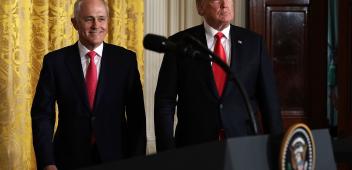Trump’s trade war pins Australia between a rock and a hard place
Originally published in The Australian.

The space to avert a damaging global trade war is fast becoming increasingly constrained. On its own, Donald Trump’s plans to introduce punitive tariffs on imported steel and aluminium will impose unnecessary costs on the US economy and others. The direct damage, however, should be limited. Far more concerning is what it signals for things to come.
The US President’s latest trade move is ostensibly aimed at protecting national security and curbing Chinese imports in particular. However, it clearly serves neither purpose well. The defence industry consumes a minor amount of the US steel market and major US allies – including Canada, South Korea, Japan and Germany – are the major sources of imports, not China (which is already subject to significant US anti-dumping and countervailing duties).
The Chinese economy, Australia’s leading trading partner, will easily shrug off the impact. Not only that, but China is looking to curb its excess capacity in these areas as part of rebalancing its economy away from exports and heavy industries. So the direct implications for China are truly very minimal.
Far more concerning are the signs for what may be next in Trump’s desire to confront China over trade. Although it may conflict with reality, he has kept the rhetorical focus on Chinese imports. He also chose to make the announcement just when Liu He, Chinese President Xi Jinping’s top economic adviser, was in town seeking to diffuse tensions.
The Trump administration’s soon-to-be-completed investigation into technology theft by China is the one to watch. Unlike other investigations, this one could result in wide-ranging protectionist measures that could indeed spark a trade war.
US complaints are likely on firmer ground here. But Trump’s confrontational approach is unlikely to elicit meaningful concessions, not least because it is explicitly intertwined with issues of geostrategic competition and America’s grievances go to fundamental aspects of China’s state-led economic model. China’s own nationalistic politics and the US decision to pursue this unilaterally rather than through the World Trade Organisation will provide China with added reasons to retaliate.
For US allies, the implications of Trump’s latest move are also troubling for reasons that go far beyond the direct economic impacts. While there are always spats here and there, the prevailing logic was that strong economic and security ties go together and are mutually reinforcing. Now however, it looks clear that economics will be allowed to undermine broader bilateral relationships, unless extensive carve-outs are granted (which at this point seems unlikely).
A trade war is in no one’s interest. All will be made poorer for it and everyone except Donald Trump seems to recognise that. Yet, most countries have signalled they will retaliate with their own tit-for-tat protectionist measures. The troubling reality is that the space for actively averting a trade war is becoming increasingly constrained.
It’s become clear that Trump is committed to following through on his protectionist agenda. Earlier speculation that Trump’s bark would be worse than his bite now looks like simple false hope, even if the exact form of actual protectionism differs from his earlier campaign rhetoric.
Everything about this policy announcement (including reports of messy internal White House dynamics) also reinforces the view that domestic politics and playing to Trump’s base will continue to override any serious economic or international policy considerations. A misguided obsession with trade deficits makes things much worse, as it suggests there may be no end in sight until the economic and political costs to the US itself become unbearable.
Each country affected therefore has a strong incentive to take a hard stance in response to US protectionism for fear that any capitulation will invite further trouble. Such overt and high-profile American protectionism also means even governments highly committed to free trade will struggle in the face of their own domestic constituents to avoid retaliatory measures that would also hurt their own economies.
Some countries have said they would take the case to the WTO. But that risks creating a difficult situation for an already vulnerable institution. If it were to find in favour of the US, it opens the door to more such protectionism under the shaky guise of national security. If it finds against, it risks triggering further American wrath that already risks sending the WTO into an existential crisis.
Those, like Australia, interested in upholding the rules-based system and averting a damaging global trade war thus find themselves stuck between a rock and a hard place.



